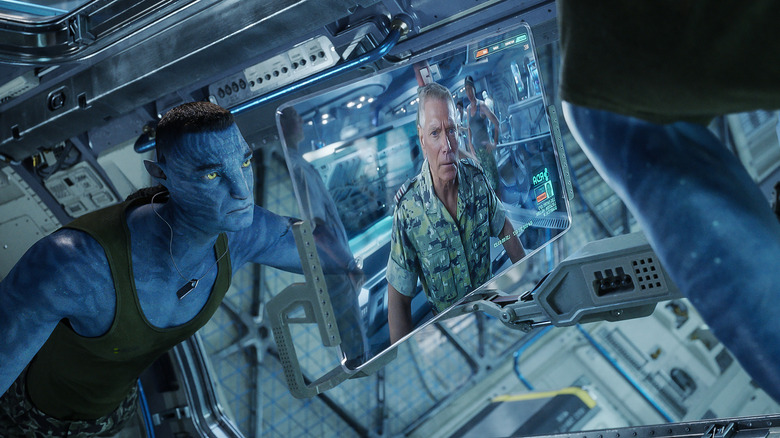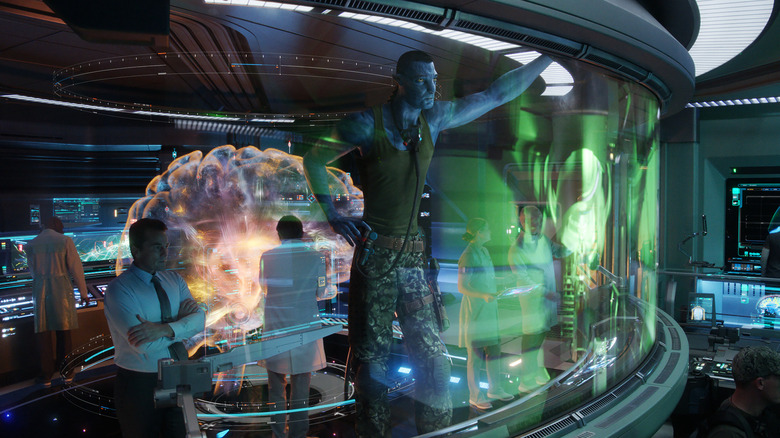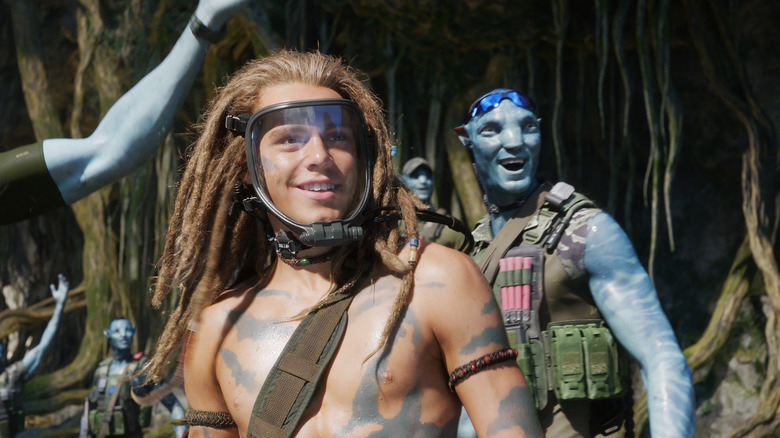The Way Of Water Somehow Makes Colonel Quaritch The Most Interesting Character In The Avatar Universe
This post contains major spoilers for "Avatar: The Way of Water."
For all the strengths of James Cameron's "Avatar," the 2009 blockbuster smash hit that changed everything, it will likely never be known for inspiring praise along the lines of "strong character work" or "memorable protagonists." Heroes like Sam Worthington's Jake Sully and Zoe Saldaña's Neytiri were never written with the goal of helping the film win the Palme d'Or award at the Cannes Film Festival or to challenge viewers with grey shades of morality. Instead, they're meant to fill broadly archetypical roles that could be easily understood by all four quadrants on a universal scale.
The same certainly applies to the original movie's chief antagonist, Colonel Miles Quaritch. Square-jawed, terrifyingly resolute, and coldhearted to the extreme, Stephen Lang's penchant for chewing up the scenery is only rivaled by the actual bulldozers and gunships that, under the soldier's supervision, ravage the idyllic Pandora jungles of the Na'vi. Yet, as equal parts loathsome and entertaining as he is to watch, even the biggest fans (well, most of them, at least) would have to admit that there isn't much there to the character. Arrogant and cruel beyond all reason, the warrior harbors a deep resentment of the tropical moon's native inhabitants that's never explored in any real depth. His narrative purpose is quite simple: Give the good guys someone to focus all their hatred towards as an avatar (heh) of the evils of colonialism and exploitation.
And then came the sequel. After dying a painful but satisfying death at the wrong end of Neytiri's poison-tipped arrows, "Avatar: The Way of Water" brings the Colonel back in Avatar form. Yet somehow, against all reason, the end of the film sees Quaritch firmly establishing himself as the most fascinating character in the entire franchise.
Back from the dead
It's amazing how so much can change from one movie to the next, isn't it?
Looking back at the 2009 "Avatar," the appeal of the steely Quaritch mostly stems from the actor's wholesale commitment to the bit. Spitting out some of the goofiest dialogue you'll ever hear and betraying zero sense of self-consciousness while ordering or personally carrying out some of the most over-the-top evil imaginable, Lang's performance helps turn the Colonel into exactly what the script called for. The ruthless killing machine stands in stark contrast to his foil, the simplistically good-hearted Jake. It's an efficient, if somewhat perfunctory role. No more and no less.
In "The Way of Water," Cameron wastes little time righting some past wrongs. Over a decade after the events of "Avatar," Jake and Neytiri (Zoe Saldaña) live a quiet life with their biological and adopted children. But this peace is shattered when humanity makes their unwelcome return to recover the prize they lost the last time around, with a reincarnated Avatar clone of Quaritch leading the charge and hellbent on avenging his own death by taking out the hated traitor Sully. Is this sudden development deeply silly and not entirely consistent with our scant knowledge of the Na'vi-hating Colonel's personality? You bet. Does it work entirely to the film's benefit anyway? Undeniably!
Though this version of Quaritch can't help but suffer from what I'll call Thanos Syndrome — remember when "Avengers: Endgame" killed off the "real" Thanos and inexplicably brought back a different, time-traveling version of the Mad Titan with absolutely no prior attachment to our heroes, thus robbing them (and us) of any real personal stakes? — this creative choice works wonders, deepening his rivalry with Jake and giving us a truly hateful villain to root against instead of starting from scratch.
Family matters
Not content to stop at retroactively adding this admittedly convenient backup plan to keep Quaritch involved in the sequel, Cameron goes a step further and gives him a son in Spider (Jack Champion), who was orphaned and left behind as a child during humanity's evacuation of Pandora at the end of the first film. Despite my initial skepticism over just how necessary this subplot would prove to be, the layers that Spider's dynamic with his estranged father add to the overall film more than justifies its inclusion. Not only does Quaritch's slowly-manifesting feelings for his son add a welcome dose of humanity and nuance to the villain, but it allows further parallels to evolve with Jake's growth into a family man of his own. With so much at stake for both characters, what could've become a rote revenge story instead turns into a tense and thrilling butting of heads that comes loaded with thematic weight.
When the climactic fight on the sinking ship arrives, all the bricklaying in various scenes of Spider accompanying Quaritch and the other soldiers on their hunt for Sully impeccably sets up the heartrending moments to come. Impressively, Cameron finds the time and space to stage a series of incredibly dynamic set pieces that are all linked by the brutal family drama between Quaritch, Sully, and their respective progeny in the final act. Moments such as a ragingly violent Neytiri nearly murdering her hostage Spider in cold blood, Spider begrudgingly saving the Colonel from drowning, and all the subtext that adds to the conflict between the two fathers elevates "The Way of Water" far above its predecessor.
Armed with much more time to shine, a couple of clunky (but necessary) retcons, and a dedicated storyline filled with thematic meaning, Quaritch comes out of nowhere to become the highlight of the "Avatar" franchise.


